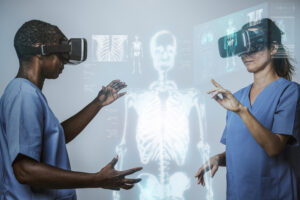Top 10 technologies that could change the future

Technology is transforming the world, shaping every aspect of our lives and tackling global challenges. Innovation is a driving force in today’s digital age, transforming how we work, communicate, and tackle global challenges. This article explores ten game-changing technologies that hold the potential to reshape our future, including artificial intelligence, blockchain, renewable energy, and biotechnology. These technologies represent a frontier where science fiction meets reality, making them a driving force in research labs, industries, and everyday life. As we explore the world of innovation, the possibilities are limitless, and the future is waiting to be shaped. In this blog post we will talk about Top 10 technologies that could change the future.
1. Artificial Intelligence (AI):
 Artificial intelligence (AI) has the potential to transform various industries, including automation, healthcare, transportation, education, finance, environment, creativity, and entertainment. Automation can streamline processes, reduce costs, and increase efficiency, while healthcare can improve diagnostics and personalized treatment plans. Transportation can be safer and more environmentally friendly with AI-powered autonomous vehicles. Education can personalize learning experiences, while AI algorithms can improve decision-making and customer experiences in finance. AI can also help address environmental challenges by analyzing data to monitor natural resources and optimize energy usage. Creative industries can benefit from AI-generated content. However, ethical and societal issues like privacy, bias, accountability, and job displacement need to be addressed to ensure responsible development and deployment.
Artificial intelligence (AI) has the potential to transform various industries, including automation, healthcare, transportation, education, finance, environment, creativity, and entertainment. Automation can streamline processes, reduce costs, and increase efficiency, while healthcare can improve diagnostics and personalized treatment plans. Transportation can be safer and more environmentally friendly with AI-powered autonomous vehicles. Education can personalize learning experiences, while AI algorithms can improve decision-making and customer experiences in finance. AI can also help address environmental challenges by analyzing data to monitor natural resources and optimize energy usage. Creative industries can benefit from AI-generated content. However, ethical and societal issues like privacy, bias, accountability, and job displacement need to be addressed to ensure responsible development and deployment.
2. Blockchain :
 Blockchain technology offers transparency, security, and decentralization, revolutionizing sectors like finance, supply chain management, and healthcare. Its distributed ledger system streamlines processes, reduces fraud, and enables new business models. Smart contracts automate complex transactions, and decentralized finance platforms democratize access to financial services. Blockchain enhances data security, privacy, and trust, fostering innovation and inclusive economic systems. As it evolves, it can promote accountability and transparency.
Blockchain technology offers transparency, security, and decentralization, revolutionizing sectors like finance, supply chain management, and healthcare. Its distributed ledger system streamlines processes, reduces fraud, and enables new business models. Smart contracts automate complex transactions, and decentralized finance platforms democratize access to financial services. Blockchain enhances data security, privacy, and trust, fostering innovation and inclusive economic systems. As it evolves, it can promote accountability and transparency.
3. Quantum Computing :
 With its ability to solve complicated problems that are currently unsolvable for classical computers and to do calculations at never before seen speeds, quantum computing holds the potential to completely transform computing. Quantum computers, with its tenfold increase in computing capacity, have the potential to completely transform domains including machine learning, material science, encryption, and drug development. Their capacity to manage enormous datasets and carry out concurrent calculations may result in innovations in a variety of fields, including AI, protein folding simulations, financial modeling, and climate modeling. With the potential to solve issues that were previously considered insurmountable, quantum computing could usher in a new era of technological innovation and advancement with significant ramifications for business, society, and science at large.
With its ability to solve complicated problems that are currently unsolvable for classical computers and to do calculations at never before seen speeds, quantum computing holds the potential to completely transform computing. Quantum computers, with its tenfold increase in computing capacity, have the potential to completely transform domains including machine learning, material science, encryption, and drug development. Their capacity to manage enormous datasets and carry out concurrent calculations may result in innovations in a variety of fields, including AI, protein folding simulations, financial modeling, and climate modeling. With the potential to solve issues that were previously considered insurmountable, quantum computing could usher in a new era of technological innovation and advancement with significant ramifications for business, society, and science at large.
4. Gene Editing :
 The precise change of DNA sequences made possible by gene editing technologies such as CRISPR-Cas9 holds great potential to transform biotechnology, agriculture, and healthcare. These technologies have the potential to improve crop yields, treat genetic illnesses, and develop organisms for a variety of uses. In the field of medicine, gene editing presents the prospect of customized targeted medicines that may be used to treat specific genetic abnormalities or even stop diseases in their tracks. Global food security can be increased by the use of gene editing in agriculture to produce crops with higher nutritional content, better resilience to diseases and pests, and greater tolerance to environmental challenges. To ensure responsible and equitable use, however, ethical concerns surrounding gene editing—such as the possibility of unforeseen effects and the requirement for equitable access to its benefits—must be properly addressed.
The precise change of DNA sequences made possible by gene editing technologies such as CRISPR-Cas9 holds great potential to transform biotechnology, agriculture, and healthcare. These technologies have the potential to improve crop yields, treat genetic illnesses, and develop organisms for a variety of uses. In the field of medicine, gene editing presents the prospect of customized targeted medicines that may be used to treat specific genetic abnormalities or even stop diseases in their tracks. Global food security can be increased by the use of gene editing in agriculture to produce crops with higher nutritional content, better resilience to diseases and pests, and greater tolerance to environmental challenges. To ensure responsible and equitable use, however, ethical concerns surrounding gene editing—such as the possibility of unforeseen effects and the requirement for equitable access to its benefits—must be properly addressed.
5. Renewable Energy :
 In addition to reducing climate change and promoting energy independence, renewable energy has the power to completely change the face of the planet. Natural resources are plentiful and limitless. By harnessing these resources, technologies like solar, wind, hydroelectric, and geothermal power lessen the greenhouse gas emissions and environmental damage that come with using conventional energy sources. Societies can increase their resilience to changes in energy prices, generate employment in the green economy, and enhance public health by lowering air pollution by switching to renewable energy. Furthermore, the production of electricity is decentralized by renewable energy, enabling local communities to produce their own electricity and advancing energy democracy. Adopting renewable energy is a critical first step toward a future that is more equal and sustainable for future generations.
In addition to reducing climate change and promoting energy independence, renewable energy has the power to completely change the face of the planet. Natural resources are plentiful and limitless. By harnessing these resources, technologies like solar, wind, hydroelectric, and geothermal power lessen the greenhouse gas emissions and environmental damage that come with using conventional energy sources. Societies can increase their resilience to changes in energy prices, generate employment in the green economy, and enhance public health by lowering air pollution by switching to renewable energy. Furthermore, the production of electricity is decentralized by renewable energy, enabling local communities to produce their own electricity and advancing energy democracy. Adopting renewable energy is a critical first step toward a future that is more equal and sustainable for future generations.
6. Internet of Things (IoT) :
 Imagine a world in which everyday objects are smartly and smoothly connected, exchanging data to improve our lives in ways we never would have imagined. That is what the Internet of Things (IoT) promises to fulfill. IoT has the power to completely change the way we interact with the world around us, from wearable technology that tracks our health in real-time to smart homes that modify the lighting and temperature according to our preferences. IoT sensors in agriculture can monitor soil conditions and manage irrigation, boosting crop yields while preserving resources. Smart infrastructure in cities may boost public safety, minimize energy use, and optimize traffic flow. But as a result of this connectedness, we must take strong cybersecurity precautions to safeguard our privacy and guarantee the reliability of the systems that we increasingly rely on.
Imagine a world in which everyday objects are smartly and smoothly connected, exchanging data to improve our lives in ways we never would have imagined. That is what the Internet of Things (IoT) promises to fulfill. IoT has the power to completely change the way we interact with the world around us, from wearable technology that tracks our health in real-time to smart homes that modify the lighting and temperature according to our preferences. IoT sensors in agriculture can monitor soil conditions and manage irrigation, boosting crop yields while preserving resources. Smart infrastructure in cities may boost public safety, minimize energy use, and optimize traffic flow. But as a result of this connectedness, we must take strong cybersecurity precautions to safeguard our privacy and guarantee the reliability of the systems that we increasingly rely on.
7. Biotechnology :
 Beyond genome editing, the field of biotechnology includes many more advances like synthetic biology, lab-grown meat, and personalized medicine. These advancements have the potential to completely transform environmental sustainability, agriculture, and healthcare. Biotechnology has the power to completely transform environmental sustainability, agriculture, and healthcare. It makes individualized care, gene therapies, and sophisticated diagnostics possible in the medical field. It creates genetically engineered crops for agriculture, which have higher yields and insect resistance. Biotechnology also provides solutions, including biofuels and bioremediation, to address environmental issues. Its ideas are expected to improve quality of life and address urgent global concerns.
Beyond genome editing, the field of biotechnology includes many more advances like synthetic biology, lab-grown meat, and personalized medicine. These advancements have the potential to completely transform environmental sustainability, agriculture, and healthcare. Biotechnology has the power to completely transform environmental sustainability, agriculture, and healthcare. It makes individualized care, gene therapies, and sophisticated diagnostics possible in the medical field. It creates genetically engineered crops for agriculture, which have higher yields and insect resistance. Biotechnology also provides solutions, including biofuels and bioremediation, to address environmental issues. Its ideas are expected to improve quality of life and address urgent global concerns.
8. Advanced Robotics :
 Modern robots have the power to completely change a number of sectors in society, including manufacturing, logistics, healthcare, and education. These robots, which have improved artificial intelligence, mobility, and skill, can automate boring jobs, improve output, and enhance safety in sectors like warehouse operations and car assembly. They can support people with disabilities, offer elderly patients company, and help surgeons during delicate procedures. Furthermore, by offering individualized tutoring and experiential learning opportunities, sophisticated robots have the potential to completely transform education. But as they become more widely used, ethical questions about data privacy, employment displacement, and the possible abuse of autonomous systems are also brought up. This emphasizes the need for responsible regulation and research to guarantee that sophisticated robots enhance society. Watch video on how advanced is robots now are click here
Modern robots have the power to completely change a number of sectors in society, including manufacturing, logistics, healthcare, and education. These robots, which have improved artificial intelligence, mobility, and skill, can automate boring jobs, improve output, and enhance safety in sectors like warehouse operations and car assembly. They can support people with disabilities, offer elderly patients company, and help surgeons during delicate procedures. Furthermore, by offering individualized tutoring and experiential learning opportunities, sophisticated robots have the potential to completely transform education. But as they become more widely used, ethical questions about data privacy, employment displacement, and the possible abuse of autonomous systems are also brought up. This emphasizes the need for responsible regulation and research to guarantee that sophisticated robots enhance society. Watch video on how advanced is robots now are click here
9. Augmented Reality (AR) and Virtual Reality (VR)

Virtual reality (VR) and augmented reality (AR) have the power to completely transform several sectors and the way we use technology. Augmented reality (AR) adds digital data to the real environment, bringing relevant information—like product descriptions or navigation instructions—to real-world encounters. Virtual reality (VR) transports people to fully virtual settings, opening up new avenues for communication, teaching, and enjoyment. These technologies have the potential to alter healthcare with cutting-edge medical simulations and therapies, change education by offering immersive learning experiences, and change the entertainment and gaming industries by introducing immersive narrative. Additionally, by facilitating virtual meeting spaces and improving communication over long distances, AR and VR can completely transform distant work and collaboration. With continued development, these technologies have the potential to produce more personalized, dynamic, and engaging experiences.
10. Nanotechnology :
 With its ability to operate at the atomic and molecular size, nanotechnology has the potential to revolutionize a wide range of fields in the future. Nanotechnology has the potential to transform a wide range of industries, from electronics and healthcare to energy and environmental sustainability, thanks to its capacity to modify materials at the nanoscale. Nanotechnology in medicine offers regenerative cures, precise imaging methods, and tailored drug delivery systems that have the potential to completely change how diseases like cancer are treated. Nanomaterials could improve the efficiency of solar panels and energy storage devices, while in electronics they allow the development of faster, smaller, and more energy-efficient gadgets. Additionally, nanotechnology can solve environmental problems with creative solutions like water purification and pollution cleanup. Applications of nanotechnology could greatly enhance human health and quality of life as it develops.
With its ability to operate at the atomic and molecular size, nanotechnology has the potential to revolutionize a wide range of fields in the future. Nanotechnology has the potential to transform a wide range of industries, from electronics and healthcare to energy and environmental sustainability, thanks to its capacity to modify materials at the nanoscale. Nanotechnology in medicine offers regenerative cures, precise imaging methods, and tailored drug delivery systems that have the potential to completely change how diseases like cancer are treated. Nanomaterials could improve the efficiency of solar panels and energy storage devices, while in electronics they allow the development of faster, smaller, and more energy-efficient gadgets. Additionally, nanotechnology can solve environmental problems with creative solutions like water purification and pollution cleanup. Applications of nanotechnology could greatly enhance human health and quality of life as it develops.
Conclusion
In conclusion, the technological landscape is changing quickly, offering fascinating chances to tackle urgent global issues and influence humankind’s future. The potential impact of these revolutionary technologies is enormous, ranging from gene editing and quantum computing to artificial intelligence and renewable energy. We can solve complicated issues, improve our quality of life, and build a more just and sustainable world for future generations if we wisely use the power of innovation. Prioritizing cooperation, inclusion, and ethical considerations is critical as we negotiate the transformative implications of modern technologies. This will help to guarantee that the advantages of technology breakthroughs are available to everyone and constructively impact society. By accepting these developments with responsibility and discernment, we may pave the future of the world. Read our blog on “The history and the future of technology”
Pingback: The 5 Biggest Tesla Robot Blunders - AtomsWrite